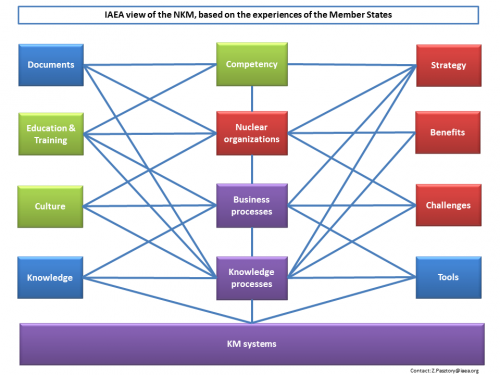Difference between revisions of "Nuclear knowledge management"
(→Related articles) |
(→Related articles) |
||
| Line 39: | Line 39: | ||
==Related articles== | ==Related articles== | ||
| − | [[ | + | [[NKM objectives]] |
[[Knowledge process]] | [[Knowledge process]] | ||
Revision as of 14:58, 30 April 2014
Template:Consolidation stage,Contents
Definition
Nuclear knowledge management is Knowledge management in the nuclear domain
Summary
Nuclear knowledge management is an integrated, systematic approach applied to all stages of the nuclear knowledge cycle. It impacts on human resources, information and communication technology, process and document management systems. Thus, corporate and national strategies relating to nuclear safety can be significantly influenced by our ability to manage knowledge both now and in the future. Nuclear knowledge management is not just useful — it is essential.
Description
Knowledge is the nuclear energy industry’s most valuable asset and resource, without which the industry cannot operate safely and economically. In addition to being essential, nuclear knowledge is also very complex, expensive to acquire and maintain, and easily lost. Member states, suppliers, and operating organizations that wish to obtain the benefits of peaceful applications of nuclear technology must also accept the responsibilities that go with it, and this includes a primary responsibility to ensure that the associated nuclear knowledge is sustainable and is sustained.
Nuclear knowledge management is the management of nuclear knowledge processes to achieve NKM goals. It supports the organization's business processes, and involves applying knowledge management practices to address the characteristics and specific needs of nuclear knowledge and nuclear organizations. It can include the application of knowledge management practices at any stage of the nuclear knowledge life cycle: research and development, design and engineering, construction, commissioning, operations, maintenance, refurbishment and life time extension, waste management, and decommissioning. Nuclear knowledge management issues and priorities are often unique to the particular circumstances of individual Member States and their nuclear industry organizations. Nuclear knowledge management may focus on knowledge creation, identification, sharing, transfer, protection, validation, storage, dissemination, preservation or utilization. Nuclear knowledge management practices may involve the application of any of a wide range of knowledge management practices to enhance and support traditional business functions and goals such as human resource management, training, planning, operations, maintenance, projects, innovation, performance and risk management, information management, process management, organizational learning and information technology support.
Nuclear organizations need to develop and implement a nuclear knowledge management strategy that provides a framework for establishing principles, policy, priorities and plans to apply knowledge management practices in the workplace. Clearly defined objectives will help establish the role of knowledge management in the nuclear organization.
Knowledge Management Systems support nuclear organizations to focus on strengthening and aligning the knowledge.
IAEA approach to Nuclear Knowledge Management
Many generic models have been developed describing knowledge management. These models are applicable in a general way, independent of the domain to be considered. For the specific domain of Nuclear KM, IAEA has developed a framework based on the experience of the member states and the long engagement of IAEA in knowledge management. This framework is depicted in Fig. 1. The framework models all fundamental components of nuclear knowledge management and their interrelations, thus presenting an integrated or holistic view of KM in the nuclear domain.
It is well recognized that knowledge management has to serve the mission and purpose of an organization with clearly defined objectives, in contrast to early attempts to just introduce knowledge management in the vague anticipation of possible benefits. Therefore, the nuclear organizations and the business process established to reach their goals are central to the framework. A KM strategy is needed to implement KM, and must be aligned with the organization's objectives and its business processes. KM needs to address the challenges of the organization, and to show the benefits in resolving them.
The business processes are supported by knowledge processes. Knowledge processes cover a broad scope in knowledge generation, validation, and maintainance: they are keys in building new knowledge, maintaining acquired knowledge and applying knowledge. The knowledge processes are enabled by tools, which include KM methods and the IT environment supportive of knowledge related activities.
The focus on people as the most important component of KM ("people-centric KM") is underlined by recognition of the need for competent workforce, which is crucial particularly in the nuclear field. Competence management and provisions for education are the means to achieve and maintain a high competence level. The development and growth of knowledge and competence depends substantially on an open organizational culture.



